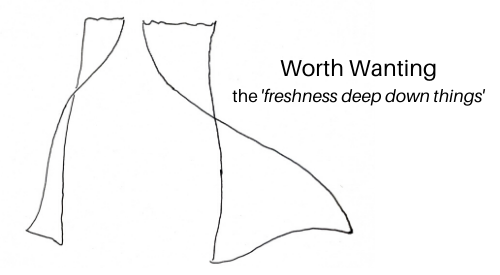
There are two matters heavy on my mind that I could pray about right now: the coronavirus pandemic and the constitutional crisis. I pray not just because I need consolation and I value companionship, but also because I need something, a kind of rescue or relief or reward for myself or others in affairs somewhat or vastly beyond my control.
All prayer begs the question: who or what are we addressing when we pray. Intercessory prayer raises an additional question: how actually does it help?
All prayer is a reaching out to someone or something transcendent. For some that’s an unjustifiable premise. If the transcendent can be accepted as given, however, the next question is: what kind of help does it actually provide? Does it work like a fixer doing whatever’s necessary on behalf of the one praying?
With regard to the pandemic and the political crisis, I am asking for three kinds of help.
About the coronavirus: first, that I and those I know and love not contract it; also, that fewer and fewer people in the world get it and that they recover well; and finally, that something like a vaccine will make the virus a moot or manageable matter so we can go about our lives.
That I avoid the virus depends largely on how I manage the probabilities by taking precautions. I may still get infected, but I can reduce the risk considerably by being careful. Chance is a natural part of how things work in the natural realm. We have systems that make use of constraints and calculations to manage chance without having to depend on transcendent agency. Do we imagine prayer obviates statistical probabilities pertaining to the many in favor of those who pray?
About the constitutional crisis: first, that it be averted; second, that we survive the damage already done and ongoing; and last, that we make changes that will prevent or preclude such crises in the future.
Likewise, that the immense recent national project of the election went as a smoothly and honestly as it actually did, is a triumph not of transcendent agency, but of preparation, and the dedication of individual people. Good plans and patient perseverance in them helped us minimize the risks of things turning out badly. Do we imagine that prayer eliminates the preparation requirement for those who pray?
And going forward, what about the return to the prior or an improved normality in these two examples? In the first case, this involves providing assistance to natural immune responses with a vaccine, and, in the second, with reforming our election system with new laws or policies. Both remedial programs are conceivable as products of familiar processes operative within the the realm of the mundane, no transcendent intervention necessary. Do we imagine a new normality will require a different set of resources in order to work than the old one did?
The real issue is not so much that we need miraculous intervention to change the odds or provide previously inconceivable resources, as that we need changes of minds and hearts to be able to figure out what to do with what’s already at hand, and to be ready and willing to actually do it.
Intercessory prayer becomes particularly fervent when there’s an urgency, when all the worst-case scenarios are vague but vivid, the potentialities of the moment are ominous, and time keeps bunching up into deadlines. We don’t know what’s going on or what we can or should do, or if we can even endure the terrifying uncertainties or the painful actualities. We pray that the dreadful intensity of the moment resolve immediately, skipping if necessary the usual steps, so that a more supportable state of affairs can ensue within which we can find our own way forward. Make it the case, we pray, that the curve actually flattens; let it happen that the assault on our national political norms and structures actually stops; take the pain away.
This kind of prayer brings to mind Byron’s classic poem The Destruction of Sennacherib. We want to wake up to find the besieging army has died all of a sudden, and that though we were distraught at night, we find ourselves by morning delivered, the Angel of Death having been busy through the night on our behalf.
(We don’t, by the way, attribute to transcendent intervention the method discovered by Haber for fixing atmospheric nitrogen which made possible modern agriculture and consequent population growth (and German explosives used in WWI).)
We have all experienced reprieves that left us weak with relief, and very grateful. Such deliverances are problematic, however. To be outcomes of prayer, they need to be unmistakably replies, not just results; they must not discredit or disrupt the forms and structures of natural agency we depend on day to day; and they have to satisfactorily resolve the equity issues (Why this at the expense of that? and Why not everyone?) that are implicit in any good (or bad) news. To conceive of a transcendent agency that intervenes in the mundane world and yet meets these requirements is a challenge.
What if, however, the transcendent is ever active but only in encounters, and has no traction on the mundane other than through the modifications of minds and hearts of ourselves and others in and through encounters? What if prayers, directed to transcendent freshness, are for a greater readiness, on the part of all involved, to notice and to seek out others and othernesses and to accept and to actively issue invitations to encounter? What if, as each encounter sets up others, these effects can ramify and multiply to the point of affecting public consciousness and behavior as a whole.
Such prayers, which are completely consonant with the agenda of the transcendent, avoid the normal dilemmas of intercessory prayer.
Falling off the cliff, we don’t pray for a bush suddenly to be there to grab onto; it was either there all along or not. It’s just happenstance that we tumble right over where it is, and have the presence of mind to latch onto it.
But when someone, especially someone influential (or even, or especially, I myself) relents, or reverses, or remembers–that is often what changes prospects enormously, and that is what happens in encounters. This is the kind of help we really need, and can realistically hope for.
Intercessory prayer, in this view, is one of the three ground of hope we can have with regard to things turning out well when we’re at a loss.
The first ground of hope is the sheer complexity of the natural and social realms as they exist that often produces the coincidences that save us (and do seem like interventions). The second ground is that transcendent freshness, in and through encounters, makes unsuspected and unpredictable options visible to us, and moves people to modify what they apprehend and aspire to. The third is the assurance we have in all our dealings with freshness that all our encounters have a fresh future forever, that the unrealized potentialities of each of them will be played out, though not necessarily in time for us to see.
These grounds of hope: that they exist, that they provide what we need, genuine help and compelling encouragement, are what we base our gratitude on. In particular that, as a result of prayer, minds and hearts, including our own, are changed to produce attitudes and actions that bring about the good outcomes we seek for ourselves and others. This is the work of transcendent freshness.
Prayer is more, of course, than asking. It’s also affirming and appreciating. So here’s my daily prayer:
Friend freshness, You who are Present whenever I or any Open or are opened To your or another’s Potentiality, energy or power, You who Made making, Introduced doing, Started saying: Let the consummation of your creation Swiftly approach and soon arrive, That new and lively cosmos Of unending hospitality, friendship and exploration, Of change without transience, Time without the past, Life without death, and You dwelling in the midst. Give us what we need to live today, And forgive us when we do What doesn’t honor you, As we forgive those who Dismiss, despise or disappoint us, And send timely help when we’re tested or attacked. You have generously invited us To share your everlasting livingness. Who you are and what you do: How impressive, how intriguing, how intimately touching, Each day, every day, forever.
and I add this intercession:
Today, freshness, get me (and all of us) to notice, as well as actively seek out, others and othernesses, and to accept, as well as actively extend, invitations to others to encounter. Amen.
